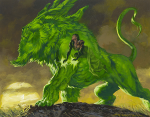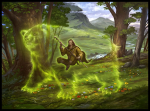Warpiglet
Adventurer
For the first time, I find myself interested in playing a druid. I have mostly played warlocks in 5e with only one exception. Somewhere recently I thought it would be interesting to play a druid.
full disclosure: I want to play a character that has a lot of creepy witch-like potential. I dislike circle of the moon and plan to play with weapons and spells. I am taking one level (likely hexblade for sword prof and flavor) and some feats to do this. When
i wild shape, I am looking for spiders and snakes and the like, almost exclusively.
but my main thought is that I have never seen the druid description seem so wide open.
are they wandering mages, sage like magic users? Are they priests focused on the divine? The intro text says sort of Yes to all of these things.
i am interested in hearing how others have attempted to make druids part of the game world. I feel I am going off label...planning to play an angry and rebellious gray
elf now who has renounced corellon and makes the woods or perhaps swamps his new kingdom.
but is he priestly or just freelance like a mage that adventures?
how do you define the role of druids?
(edit for typos)
full disclosure: I want to play a character that has a lot of creepy witch-like potential. I dislike circle of the moon and plan to play with weapons and spells. I am taking one level (likely hexblade for sword prof and flavor) and some feats to do this. When
i wild shape, I am looking for spiders and snakes and the like, almost exclusively.
but my main thought is that I have never seen the druid description seem so wide open.
are they wandering mages, sage like magic users? Are they priests focused on the divine? The intro text says sort of Yes to all of these things.
i am interested in hearing how others have attempted to make druids part of the game world. I feel I am going off label...planning to play an angry and rebellious gray
elf now who has renounced corellon and makes the woods or perhaps swamps his new kingdom.
but is he priestly or just freelance like a mage that adventures?
how do you define the role of druids?
(edit for typos)
Last edited:



